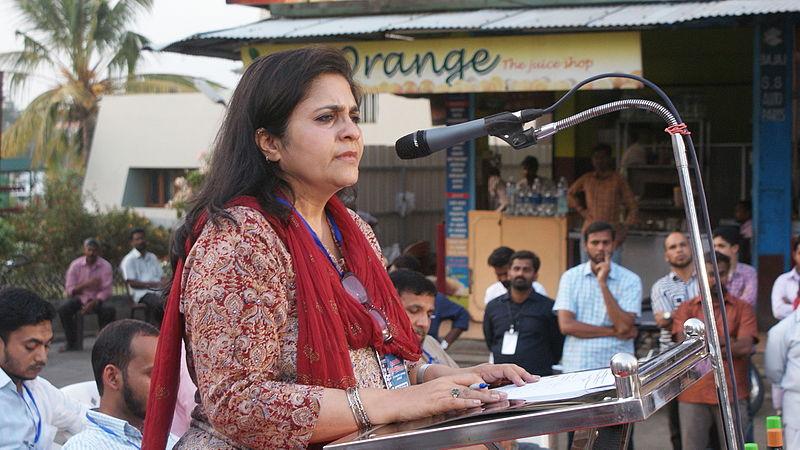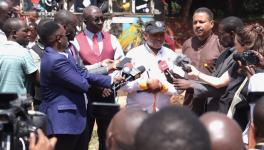What Case Against Teesta Setalvad Means for Protest in India

The Supreme Court is hearing renowned activist Teesta Setalvad’s application for interim bail. Gujarat Police arrested her on 25 June, a day after the Supreme Court’s veiled but critical observations in 2002 Gujarat riot victim Zakia Jafri’s case that all involved in the “abuse of process need to be…proceeded against in accordance with law”. The key allegation of the police against Teesta is that she conspired to implicate powerful people, including then Gujarat chief minister Narendra Modi, in the riot-related investigations.
It is impossible to pre-judge today’s ruling, but how the case against Teesta proceeds is highly relevant to the culture of protest in India. Her arrest conveys to those who charge powerful executive figures with the wrongdoing that they could end up in the dock like her.
“What wrong did Zakia or Teesta do? They have only complied with the Supreme Court’s directions since 2012,” says Anand Yagnik, Gujarat High Court advocate and activist. “The court said Zakia could file a protest petition if she disagreed with the closure report of the Special Investigative Team (SIT) examining the riots. Where is the mala fide? It is the Supreme Court which pursued the 2002 riot cases and appointed an amicus curiae, whom Teesta assisted,” he says. “Can anybody show me one piece of evidence in the SIT report supporting an ulterior motive on Teesta’s part? Actually, the political dispensation is undemocratic, and she is a victim of witch-hunting,” says Yagnik.
In 2012, the Supreme Court directed Zakia that she could file a protest petition if she disagreed with the findings of the SIT appointed by it to examine allegations of a larger conspiracy behind the 2002 riots. The SIT report had found no prosecutable evidence against Modi and 63 others, including senior government officials. Zakia did file such a petition, in 2013, in a metropolitan court in Gujarat. The court rejected it and accepted the SIT’s findings. She approached the High Court next, which also accepted the SIT report. In 2018, she approached the Supreme Court, and it is this case which had a final hearing on 24 June.
Those who are demanding justice for Teesta also see the case against her as a signal to civil society and opposition political outfits to join hands or the ruling Bharatiya Janata Party (BJP) will continue to unleash its spree of arrests. “Previous governments were oppressive too, especially during Emergency, but not a shade on what is happening now. Civil society is the only space still proposing alternative ideas to the state’s notions, and hence is under attack,” says human rights activist Ravi Nair. Earlier this year, Medha Patkar was charged with misusing funds, and Stan Swamy died in prison last year. “To stop such occurrences, parties must leave differences aside and join hands with each other and civil society,” he says.
Many cannot help recalling two contrasting recent arrests, of film-maker Avinash Das and AltNews co-founder Mohammad Zubair, both picked up for their tweets. Delhi Police arrested Zubair on 27 June, two days after Teesta, and a court granted him bail after 23 days. Das, arrested on July 20, got bail from an Ahmedabad court the next day. But Thursday marks Teesta’s 69th day in jail.
For poet-activist Shamsul Islam, people have realised that the fight for justice and against communalism cannot be won “through symbolic protests and demonstrations”. He recalls that just last year, India watched as the powerful peasant unions of Punjab raised a massive movement that forced the Centre to repeal its three controversial farm laws. But while the farm movement succeeded, there was hardly any outrage over Teesta’s arrest.
Is Teesta in trouble because her work not only challenges Hindutva but Prime Minister Narendra Modi? After all, she helped victims of the 2002 Gujarat riots secure justice, and Hindutva is the BJP’s ideology, which has ruled at the Centre since 2014 and in Gujarat since 2002. “Indeed, communalism is a different kind of animal,” says Parminder Singh, state secretary of the AFDR or Association for Democratic Reforms in Punjab. “But once there is a mass movement, it becomes difficult for the state to act against it. And when the police know people back something, it becomes difficult for them to suppress it,” he says.
The movement of Punjab’s farmers also did not spring up overnight. It took decades to reach the point where its democratic and anti-communal outlook became the norm rather than the exception among Punjab’s peasantry and youth. The result is that journalist Rana Ayyub’s book, Gujarat Files, became immediately available in Punjabi and gained a wide readership. It also explains why, in late 2020, 80,000 people of all faiths protested at Malerkotla, Punjab’s sole Muslim-majority district, against the CAA, NRC and NPR. People from Punjab participated in the Shaheen Bagh protests as well. “Such protests should be repeated, and different organisations and people must come forward for Teesta and others,” says Singh.
Recently, the importance of wider democratic movements hit home again when the Centre’s Agnipath scheme suddenly curtailed military recruitments to four-year terms. Once the young aspirants’ protests turned violent, without a democratic leadership, the Centre could push them back easily.
Propaganda and polarising politics also undercut solidarity, and there is plenty of it against Teesta and others who believe in democratic rights. For example, it has been spread in Gujarat that Teesta was close to the Congress party, and they worked in concert on 2002 riots cases. For two months, this argument of Gujarat Police has followed Teesta’s bail applications, from the sessions court to the High Court and the Supreme Court.
Shamsul echoes the concern: “Teesta’s problem is she spoke about not Muslims but Hindus and Muslims. Such solidarity would end the politics of Muslim-Hindu polarisation,” he says, adding, “She was actively engaged with minorities’ concerns in Assam. She fought Muslim fundamentalism as much as Hindu. The state wants to stop her from doing these things,
Rights activists have always warned that voting is crucial to national life but does not guarantee the state’s neutrality or responsiveness to public demands. Mukul Sinha, who died in 2014, contested from Muslim-majority Shahpur in Ahmedabad but got hardly any votes though he spent his life fighting for minority rights. Manipur’s Irom Sharmila went on a 16-year hunger strike against the Armed Forces Special Powers Act but secured just 90 votes in the 2017 Assembly election.
That is why it is crucial for democratic-minded people across India to organise against the Hindutva onslaught and raise the material demands of people. For now, all eyes are on Teesta’s bail hearing in the Supreme Court and what twists and turns to expect in the investigation into the allegations against her
Get the latest reports & analysis with people's perspective on Protests, movements & deep analytical videos, discussions of the current affairs in your Telegram app. Subscribe to NewsClick's Telegram channel & get Real-Time updates on stories, as they get published on our website.
























